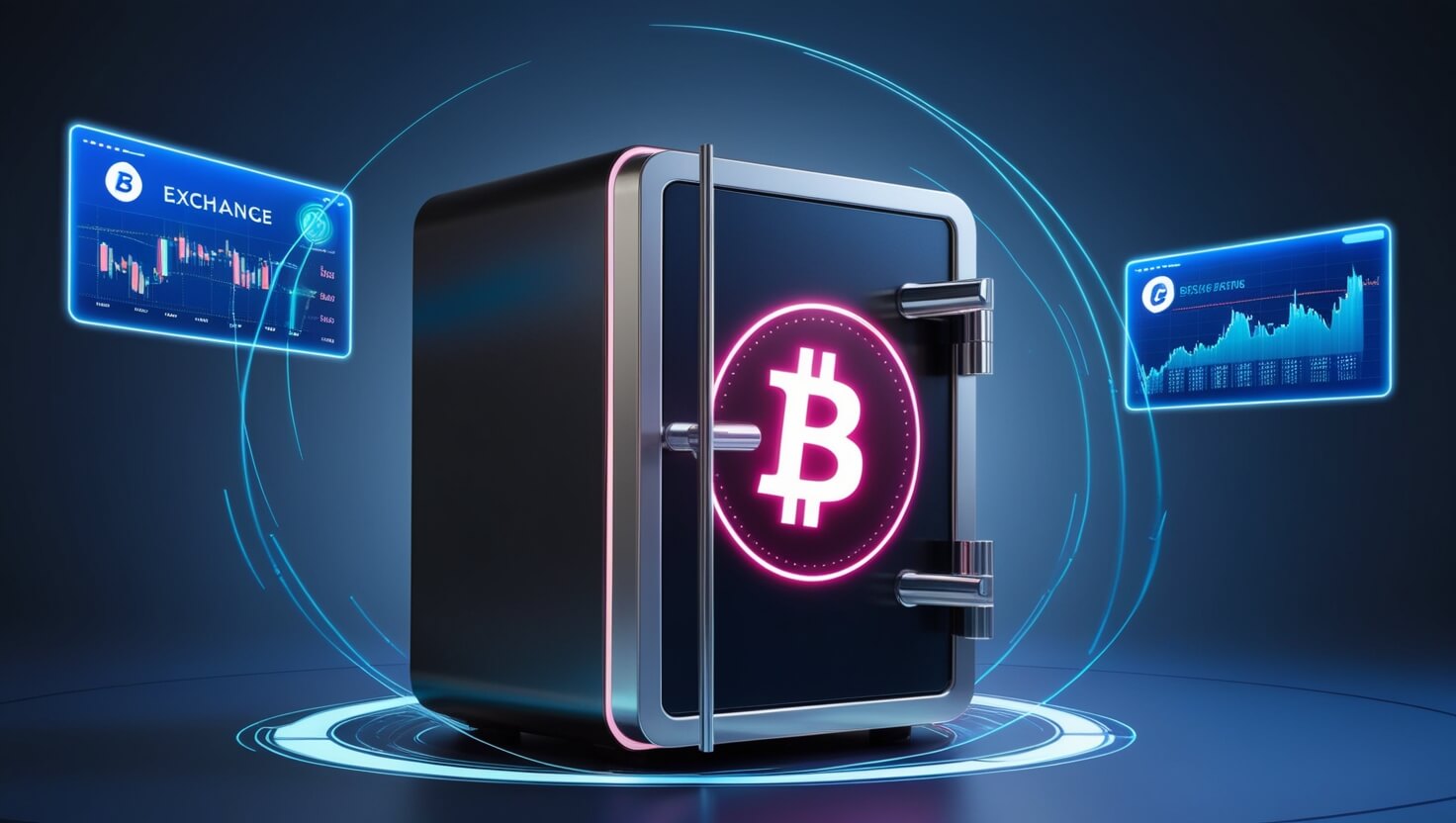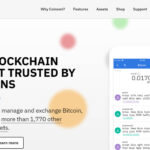In this article, I Will discuss the Is Crypto Safe on Exchanges. On the one hand, exchanges are helpful because they allow for the convenient buying, selling, and trading of digital assets.
On the other hand, there are inherent risks involved. One of the main concerns for cryptocurrency holders is how engage with an exchange without exposing themselves to major traps.
What is a Cryptocurrency Exchange?
Cryptocurrency exchanges are digital platforms where users can buy, sell, and trade Bitcoin, Ethereum, and other digital currencies. The exchanges buy and sell crypto to traders and can also sell the tokens through the free market.

Users can also selects the decentralization option, which is a CEX which does not have a built-in authority and instead works on blockchain technology.
Besides, other services like staking, futures trading, and even conversion from fiat to crypto are also provided my some exchanges. While choosing an exchange, it is worth taking into consideration security, liquidity, and fees.
Types of Crypto Exchanges
- Centralized Exchanges (CEX)
- Operated by companies that provide centralized services.
- Users must trust the exchange to manage their funds securely.
- Examples include Binance, Coinbase, and Kraken.
- Offer advanced trading features, high liquidity, and customer support.
- Decentralized Exchanges (DEX)
- Operate without a central authority.
- Enable peer-to-peer trading through automated processes.
- Examples include Uniswap, DeFiSwap, and SushiSwap.
- Provide enhanced privacy and control over funds.
Is Crypto Safe on Exchanges?
Storing cryptocurrency on exchanges carries some risks. While certain exchanges have solid protective measures in place, there is still a considerable risk of hacking, fraud, or even poor management.
It’s best to only trust reputable exchanges, take extra precautions such as enabling two-factor authentication, and keep the bulk of your crypto in a personal wallet rather than on the exchange.
Are There security risks associated with cryptocurrency?
Cryptocurrency does come with certain security concerns. Here are a few notable issues.
Your payment is not protected in any legal way unlike how payments done with traditional debit or credit cards are protected. Take, for example, cases of unauthorized transactions where the cardholder may not be responsible owing to legal protection.
That normally is not the case with crypto payments. Falling prey to a scam means your money is gone. And there is nothing you can do to recover your funds.
The most concerning issue is the prevalence of crypto scams. You may have experienced phishing scams threatening to leak sensitive photographs taken from your web camera for a Bitcoin ransom, or perhaps you’ve received a fake notification advertising winning an exclusive NFT or some crypto prize.
These are just a few cases of scams you need to be alert for. Be wary of people who insist on receiving only payment in cryptocurrency as that suggests they may have malicious intentions. The request to make a quick payment is also a big sign of fraud.
You can’t change or undo a transaction after it has been made, and most cryptocurrencies are based on a blockchain system that makes sure that every transaction is fully signed and sealed forever.
This can be advantageous because a standard protocol is hard to breach, but it is also problematic if something were to go awry; there is no way to alter or refute the payment. You can forget about a customer service line that will issue a refund.
These are only a fraction of the problems concerning security with regards to cryptocurrency, and as the industry develops, more and more problems will arise. To stay up to date, it is wise to always check trusted sites such as the U.S. Federal Trade Commission for crypto and security scams.
Common Risks Associated with Crypto Exchanges
For crypto exchanges, these factors are the most significant risks:
Theft and Unauthorized Access– Hacking is a very common crime nowadays, and exchanges are always a favorite target. This can lead to significant fund losses.
Legal Matters – Governments have the tendency of putting limitations or even shutting down certain exchanges, which can severely impact access to resources.
Fake Schemes and Deception– There is a chance that some exchanges partake in crimes and ultimately vanish with people’s money.
Risks Without Liquidity– Lack of liquidity makes the market prone to price manipulation and removal of trades.
Decentralized exchanges (DEX) weaknesses– DEX can have flaws that can be used against them.
Phishing and Social Engineering Attacks– Sensitive information can be easily obtained from users through deception.
Restrictions on Withdrawal– Some exchanges impose challenges on withdrawals, which can severely hinder access to resources.
Disruptive Changes in the Market– Price changes caused by actions such as wash trading in combination with pump and dump schemes are usually extremely sudden.
These risks aid in the decision on why using established exchanges, activating security measures and saving assets in private wallets can be greatly beneficial.
Comparison of Security Measures in Top Crypto Exchanges
| Security Measure | Coinbase | Binance | DeFiSwap |
|---|---|---|---|
| Two-Factor Auth (2FA) | Yes | Yes | Yes |
| Cold Storage | 98% Funds | 95% Funds | Smart Contracts |
| Regulatory Compliance | SEC Licensed | Global Compliance | DeFi Protocol |
| Regular Audits | Quarterly | Annually | Open Source Audits |
| Bug Bounty Program | Active | Active | Active |
| Insurance Coverage | Up to $250M | User Funds SAFU | Nexus Mutual |
| KYC/AML Compliance | Yes | Yes | Optional |
Security Measures For Crypto Exchanges Identification
These are the usual security measures that reputable crypto exchanges employ to enhance the security of a user’s funds:
Two-Factor Authentication (2FA): An additional second confirmation step like a text or access from an authenticator app is required to login.
Cold Storage: A large proportion of the funds is stored offline in ‘cold wallets’ to protect them from online threats.
Encryption: User data as well as user transactions are encrypted to protect them from being accessed without permission.
Anti-Phishing Measures: Tools or alerts that help users identify and avoid phishing attacks.
Withdrawal Whitelists: Approved wallet addresses can be set by users which makes unauthorized withdrawals nearly impossible.
Regular Audits: Some exchanges are subjected to third parties in order to check compliance with certain security regulations.
Insurance Funds: A number of exchanges are ready to cover user’s losses after a hack, so they offer insurance.
Account Monitoring: Accounts are monitored for any suspicious activities or transactions through advanced systems.
Safeguarding Your Crypto Investments
Use Secure Wallets:
Hardware Wallets:
These are devices like Ledger or Trezor that keep private keys offline and immune to cyber attacks. Best suited for crypto that is being held for an extended period or in large quantities.
Software Wallets
These are wallet applications on desktop or mobile such as Exodus and Atomic Wallet. Make sure they are from known developers and have received regular updates.
Custodial and Non-Custodial Wallets
Custodial Wallets:
These wallets are maintained by a third party service which means less control over private keys. More convenient, but at the expense of an increased risk of a central point of failure.
Non-Custodial Wallets:
Now these wallets offer a higher degree of security as there is full control over private keys. Need to be more cautious, as you have to take care of backing up and securing recovery phrases.
Enabling Security Measures:
Strong Password
Create a unique combination of letters, numbers, and special characters. Stay away from easy to guess passwords and think of a password manager for additional security.
Regular Updates
Update your devices and software frequently, as updated versions usually have some significant security baking in.
Security Software
Install a respectable antivirus and anti malware softwares. Add firewalls to stop unwanted access.
Stay Alert for Potential Scams
Phishing
Always scrutinize URLs and email addresses, particularly in your communications. Be weary of random messages that ask for confidential details.
Follow Up:
- Check information with the respective organizations or authorities.
- Activating account activity notifications may help track unwanted changes made to the account.
Prevent Fraudulent Schemes
- Be on alert for investment opportunities that appear too wonderful.
- Never provide anyone, even alleged trusted parties, with private keys, recovery phrases, and passwords.
Change Asset Concentration
Redistribute Holdings
Never put all your funds into one exchange or one wallet. Having multiple systems in place mitigate the consequences of a primary system failure.
Class of Assets Varied
Shift your focus towards investing in a combination of different cryptocurrencies and some classical assets in order to manage risk.
Taking Care Of Your Crypto Assets
Get Hardware Wallets: to prevent hacks, keep large amounts of crypto in secure hardware wallets.
Have 2FA: Adding two-factor verification will be helpful on exchanges, wallets, and other accounts related to crypto.
Have Various Backups: Store varying secure copies of your wallet recovery phrases and place them in different containers.
Secure Internet: When logging into crypto accounts or conducting transactions, a VPN should always be used and public hotspots should be avoided at all costs.
Stay Informed: Keep track of advancements in cryptocurrency security to always stay prepared for the new threats.
Monitor Accounts: Frequently scan for and review suspicious or unusual activities across your accounts.
Avoid Phishing Links: Never open doubtful links or files, and be on guard when using unknown applications.
Conclusion
To sum it up, although crypto exchanges have their benefits, they result in massive negative aspects too. Whether your funds are secure or not heavily depends on the measures the exchange has in place and what you personally do.
For maximum funds safety, make sure to use reputable exchanges, enable two factor authentication, and think about transferring large amounts to secure wallets for long term storage.










